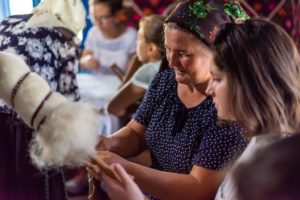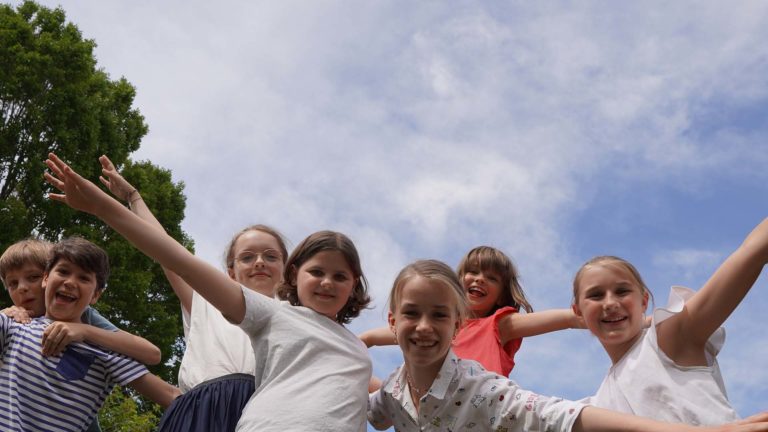
ABOUT THE REFE-PROJECT
The REFE-Project can be described as the predecessor of the EcoFootprint Romania Project: it ran between 2021 and 2022 and involved a co-operation between two partners of the EcoFootprint Romania Project (Teatrul Vienez de Copii and Schule für das Leben).
The project aimed to raise awareness among the youth of humanity’s lifestyle impact on the health of our planet. It focused on participants’ understanding of how they affected the capacity of the environment to sustain their current way of living. Educating the younger generations was considered the best way to secure a better future for humanity. Furthermore, the participants could see that, by modifying some aspects of their current lifestyle, they could actively participate in the long-term protection of the Earth, making more sustainable decisions from that point forward and having a significant contribution to the health of the ecosystem.
The main goal of the REFE-Project was to raise awareness regarding the consequences of climate change, consumerism, and mass production, which were deeply rooted in Romanian society. “Reducing the Ecological Footprint through Eco-awareness (REFE)” aimed to increase the knowledge of young people about the long-term consequences and provide good practice examples of how to live a sustainable lifestyle.
To achieve this goal, 20 young people from an urban area were selected and took part in a 2-week training in Breb, Maramureș (Romania). Surrounded by nature and with a sustainable mindset, they learned how to reduce their ecological footprint. Based on the information gained during this training, a grade-6 curriculum was developed to enable the spread of ecological thinking to a greater number of children. This was created with a focus on eco-friendly ways of living and with the purpose of inspiring children to adapt their lifestyle to environmental needs. The knowledge gained and the outcomes of this project were disseminated in a conference and fair and were further made available through an eLearning platform.
Through its goals and activities, REFE contributed to the National Climate Strategy of Romania, which mirrored the target of the Paris Agreement of having the country’s emissions reduced by 40% by 2030. Thus, we strongly believed that this project would support Romania in making use of its valuable knowledge to protect the environment and reduce the country’s ecological footprint through awareness-raising and capacity-building.
OUR GOALS WERE:
01.
— Producția de cunoștințe
A group of 20 young people participated in ecological footprint testing. They learned to live more sustainably during a two-week camp in Maramureș, Romania, where a second round of testing happened. A third testing took place upon their return to their home cities.
02.
— Împărtășirea de cunoștințe
The findings of the project, as well as the necessity for a more sustainable lifestyle, wasconveyed through conferences, media channels, eLearning modules, a documentary, and a specially developed theatre play.
03.
— Îmbunătățirea educației
An Eco-Awareness curriculum was developed to be proposed for the Romanian national education system.
04.
— Impactul local
Located in Romania, the project showcased the country’s abundant natural spaces. Co-operation with Romanian NGOs as Project Partners ensured that the knowledge shared will continue to permeate future local projects.
05.
— Crearea de rețele
High-attendance conferences uniting teachers, organisations, and political figures was organised in Romania throughout the duration of the project.
ECOLOGICAL FOOTPRINT CALCULATOR
The ecological footprint test is an assessment tool to analyse the impact of human lifestyle on the planet. It encompasses eight main categories that reflect how human consumptions and activities affect the environment. These categories reflect the human footprint on the planet, directly assessing water usage, transportation means, housing, electricity consumptions, and indirectly by analysing impact related to goods consumption: food, clothing. All the scores awarded to each question have a statistical background to better assess the overall impact. Some answers have negative scores, because they positively affect the environment, therefore reducing the total. The number of points is converted into the number of planets needed to support the whole population if all inhabitants would have the current behaviour of the applicant, and the test can be reanalysed by making smaller or bigger changes to see how these changes improve the ecological footprint. Thus, the test is also a tool for awareness and ecological education.
Click here to download:
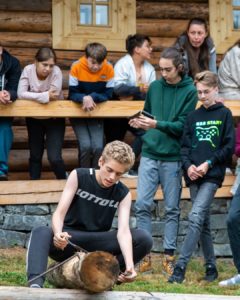
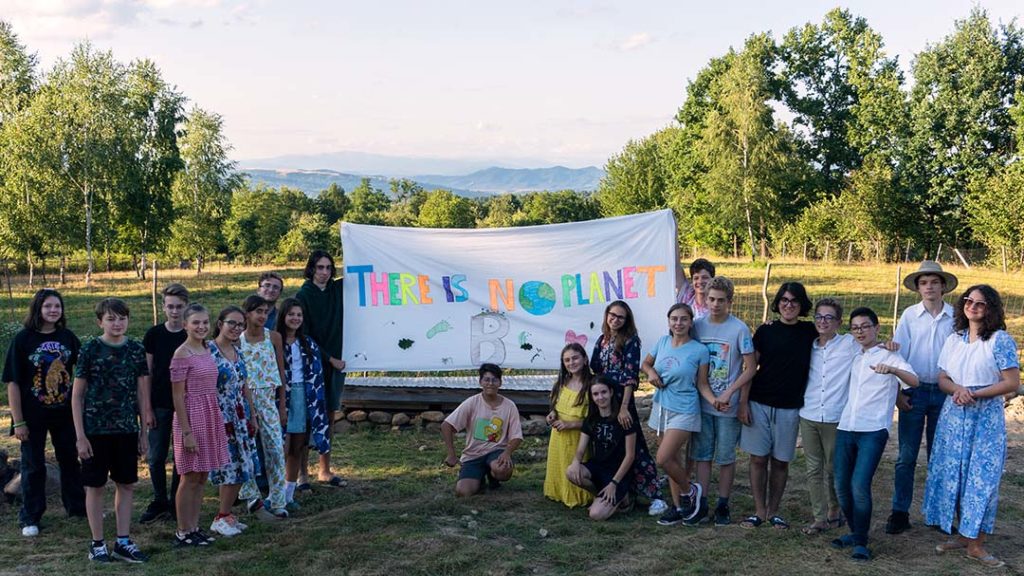
GUIDE: HOW TO PLAN A SUSTAINABILITY CAMP?
Prin ghidul nostru "Cum planificați o tabără de sustenabilitate?" dorim să încurajăm profesorii să încerce ceva nou: de ce să nu mergem în natură pentru câteva zile, făcându-i pe copii și tineri să-și conștientizeze propria amprentă ecologică și să încerce stiluri de viață alternative?
În ghid, explicăm în detaliu cum poate fi organizată această activitate, ce conținut poate fi pregătit și discutat cu copiii, cum poate fi măsurată amprenta ecologică și cum poate fi tratat acest subiect serios în mod creativ.
Descărcați ghidul aici:
DOCUMENTARY
4 to 1 Earths: An Adventure in Ecology
We filmed a documentary about the summer camp experience, highlighting the methods that anyone can apply to reduce consumption in their daily lives and helping raise awareness about environmental protection.
Here you can find a playlist of all episodes on YouTube. Every episode is full of interesting revelations, fun stories and intriguing activities – and with Episode 7, we even enrolled in Film Festivals!
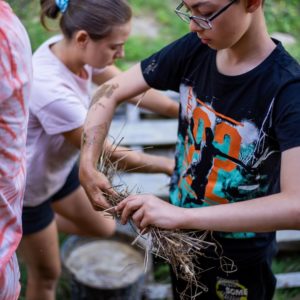
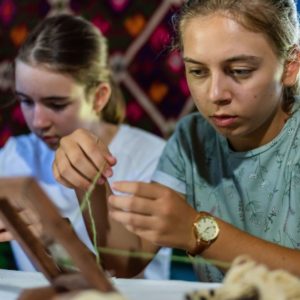
TEACHING MATERIALS
The knowledge attained will be used to create teaching material for educators and teachers.
The teaching materials are a summary of the most urgent environmental problems as well as a small guide on how to reduce the ecological footprint. It shows a pathway to show children that they too have an impact on the environment. It is a reference book that can be worked through with the children.
Download the materials here:
THEATRE PLAY
Shakespeare and the Golden Toad by Sylvia Rotter and Magdalena Bruckmüller
The aim of the play is to playfully make young people aware of the urgency of waking up to the impending ecological disaster in order to lessen or avoid them. The play will end with a plea to the audience not to stay in their seats but take action and shift their priorities towards protecting nature.
Descărcați ghidul aici:
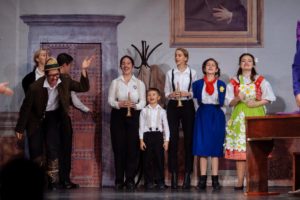
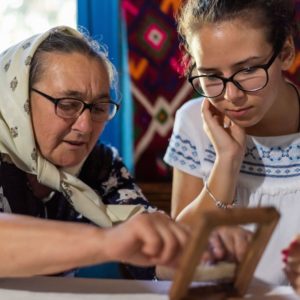
AUXILIARY WORKBOOK
The student workbook on environmental education encourages students, individually or in teams, to explore and understand issues such as recycling, food waste, sustainable development, energy saving, ecological footprint, etc., to become aware of the need to protect nature, to use natural resources as rationally and efficiently as possible.
Descărcați ghidul aici:
ELEARNING MODULES
The open-access eLearning modules are a format to make it possible for all young people in Romania to inform themselves about the topic of sustainability, incl. the ecological and carbon footprint and on how to reduce their footprints. Therefore, it will not only include general information on environmental problems (section 1) but will also include suggestions on activities that can take place individually or together with other young people to overcome these problems (section 2). The eLearning modules also aim to reach youth organizations or other institutions who would like to implement a summer camp on the ecological footprint themselves. For this, a third section will offer guidance for the preparation and implementation of a summer camp.
Access the eLearning platform here!
